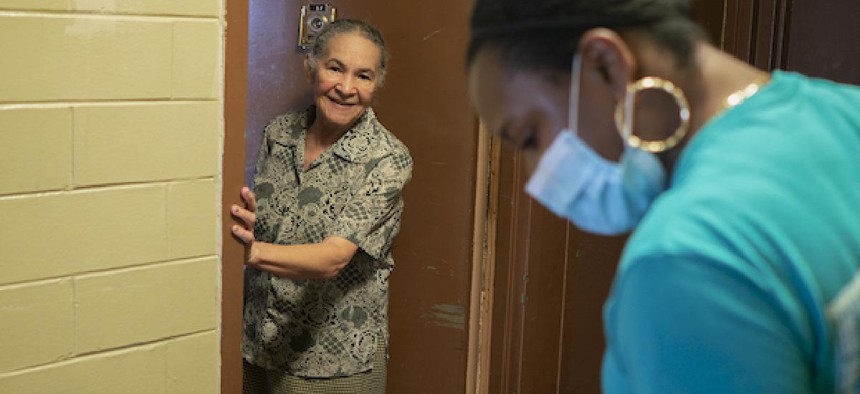Nonprofits
Many NY nonprofits are feeling burned out
Resilience and innovation can help resolve short-term challenges but there’s a long haul ahead.

A New Yorker being served a meal from Citymeals on Wheels. Citymeals on Wheels
Since the pandemic began in March 2020, front-line staff at New York nonprofits have confronted unprecedented challenges.
Uncertainty, anxiety, disruption, extreme cleaning, shortages of supply, staff and funding, along with increased demand for services, have created a perfect storm for nonprofits. Lacking a guide to best practices for such a turbulent time, nonprofits are navigating uncharted waters with extraordinary resilience and innovation. While some nonprofits have been able to hold strong up until now, grit has not been enough for other nonprofits to sustain their staff and services, as well as funding, in the face of this prolonged public health crisis.
“We haven’t had burnout,” Barbara Zobian, founder and executive director of Candlelighters NYC, which helps children fighting cancer and their families, told NYN Media.
However, the pandemic has placed some strains on the organization’s pre-COVID-19 operations. “Introducing families to each other was one of the main things Candlelighters did before the pandemic hit,” she continued. “Since the pandemic, we have to get together on Zoom and it just isn’t as effective as meeting in person.”
Vaccinations, enhanced communications and education have been key to addressing pandemic disruptions at the Visiting Nurse Service of New York. “Our staff has become more and more confident taking care of COVID-19 patients,” Andria Castellanos, executive vice president and chief provider of services at VNSNY said.
Access to vaccines “provided many of our field staff with the security and peace of mind that they could protect themselves, their family members and their patients,” but as the delta variant emerged, “clinicians have fears just like everyone,” Castellanos said.
To address those fears, VNSNY keeps the staff “informed with regular updates on precautions and protocols,” Castellanos said, adding that managers, Occupational Health Services, a group of clinical experts on call to answer questions that staff may have about certain protocols, procedures or providing health services, in addition to human resource teams are available to answer questions in real time. Enhanced communication and education reinforce staff confidence and ensure that patients are informed and understand why clinicians may be asking more questions or taking more time than usual.
The staff at the YMCA of Greater New York “have demonstrated extraordinary resilience,” Matt Ferraguto, senior executive of communications and media at the organization, told NYN Media.
“They have adapted the Y’s services in the face of great adversity,” Ferraguto said.
The YMCA has hosted in-person learning labs, after-school programs, hybrid teen programs, emergency childcare for essential workers, wellness checks for local seniors, and vaccination clinics. To recognize their staff’s service and sacrifice, the YMCA closed its branches on August 30.
To address workplace burnout, Catholic Charities Community Services, Archdiocese of New York offers a variety of support to its staff, including upgrades to cell phones, hazard pay and incentive-based compensation to front-line workers. “Balancing the demands of our essential work against the importance of sustaining the physical and mental health of our workforce has been and continues to be a central focus of our work,” Beatriz Diaz Taveras, executive director at Catholic Charities Community Services, told NYN Media.
Safe Horizon, an organization that provides assistance to victims of abuse and violent crimes, remained open and operated both in-person and remotely throughout the pandemic. Safe Horizon’s HOPE hotline (800-621-HOPE), domestic violence shelters and child advocacy centers have also remained open to provide on-site service to clients while practicing COVID-19 protocols. “We adapted quickly to ensure that we can continue to provide ongoing 24/7 service for our survivors and constituents,” Laura Vialva, director of Safe Horizon’s media relations, told NYN Media.
The impact of the pandemic has been harsher on the front-line staff of Citymeals on Wheels. The organization employs close to 500 individuals, all designated essential workers, who have been working in kitchens at senior centers and delivering meals “at an unbelievable pace,” Rachel Sherrow, associate executive director and chief program officer, told NYN Media.
Citymeals, along with 31 community-based partners, deliver meals to 20,000 homebound elderly clients and has delivered 500,000 more meals during the pandemic than it would in a typical year.
“We have not missed a delivery,” Sherrow said. “Many are feeling like there’s no end in sight, with senior centers still operating at 25% capacity and the city’s Get Food program, which serves 30,000 senior citizens, ending on Oct. 1. The demand for feeding and hunger programs will grow. It’s unclear where the funding will come from but more is needed.”
According to New York Alliance for Inclusion and Innovation’s report on front-line direct support professionals in the nonprofit sector, there is a vacancy rate of 24.7% in direct support professionals statewide. “The remaining DSP’s (direct support professionals) are working longer hours and days, two and three shifts in a row, and are becoming burned out,” Michael Seereiter, president and CEO of the trade association representing agencies that provide direct support services to individuals with disabilities in New York State, told NYN Media.
To address this crisis, Seereiter calls for “historic investment in DSP wages, to make these jobs more competitive, and a series of investments to bolster and build up the DSP profession into a viable career choice to raise a family.”
As nonprofits strain to stay open and meet the growing needs of their community during the pandemic, they have adapted to the challenges with new technology, innovative programs and additional support to bolster staff morale. Vaccinations provided hope for better times but the delta variant put uncertainty back in the spotlight. Uncertainty has become the new normal, yet one thing is certain, nonprofits need secure funding to provide efficient service.
